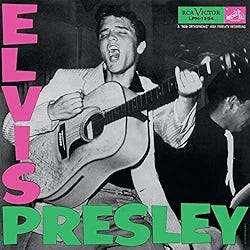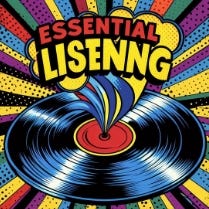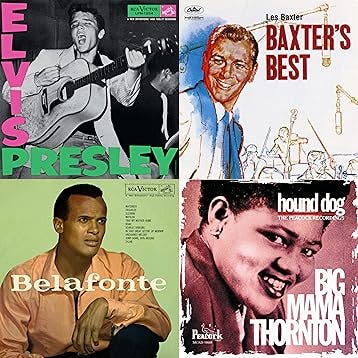I love Elvis. I had one of those compilation records you would mail away for after seeing it advertised in a commercial during a Brady Bunch or Gilligan’s Island rerun. You’d scrape together some coins you’d been stashing from your allowance, give them to Mom, and ask her to scratch a check. Six to eight weeks later you’d get a flat, thin cardboard box in the mail. You’d rip that sucker open and place the magical black vinyl disc on your little record player. Then you’d listen to the music over and over playing the album straight through back-to-back-to-back until Mom called you for supper. And you would do that for many days until you found another childhood obsession. Kind of like how kids today do it with their favorite animated movies I suppose.
Anyway, I really enjoyed this album. It’s a landmark recording by a landmark rock act. My Rating:
I must acknowledge the controversy about Elvis and the accusation that he appropriated Black artists’ work with barely any recognition of them and no monetary compensation. “Hound Dog” was first recorded by Big Mama Thornton a few years earlier and was a massive hit. However, it was confined to R&B radio and only appeared on charts called “Race Records” (a truly reprehensible term looking from 2024, but sadly probably not especially controversial in 1940s America) before the name of the chart was changed to R&B. There is no disputing that the music industry was thoroughly racist in Elvis’ time. I’m not sure Elvis the man himself was racist. This seems unlikely to me. There is a famous quote attributed to Elvis that seems to be the genesis of the idea that Elvis was racist. It goes something like, “The only thing Negroes can do for me is buy my records and shine my shoes” The “shine my shoes” quote came from a 1957 article called “How Negroes Feel About Elvis,” published in a periodical called Sepia. The writer gave two stories for where Elvis was alleged to have uttered the quote. One was a rumor that Elvis had made this remark during a show in Boston and the other story was that he’d said it during an interview with Edward R. Murrow.
As Stereo Williams wrote for The Daily Beast in 2017:
At the time of the article’s publication, Elvis Presley had never been to Boston. It was also alleged that he’d said it on Edward R. Murrow‘s Person to Person TV show—but he hadn’t appeared there either. Louie Robinson, Jet magazine’s associate editor, tried tracing the actual origins of the quote and came up empty. So he tracked down Elvis himself, interviewing the singer in his Jailhouse Rock dressing room in the summer of 1957.
“I never said anything like that,” Elvis said at the time. “And people who know me know I wouldn’t have said it.”
“A lot of people seem to think I started this business,” Elvis continued, regarding his “King of Rock ‘N’ Roll” status and reputation. “But rock ‘n’ roll was here a long time before I came along. Nobody can sing that kind of music like colored people. Let’s face it; I can’t sing it like Fats Domino can. I know that. But I always liked that kind of music.”
“I always wanted to sing like Billy Kenny of the Ink Spots,” Elvis was further quoted as saying in the Jet interview. “I like that high, smooth style.” But Presley acknowledged that his own voice was more in line with the originator of the song that he would cover for his first single. “I never sang like this in my life until I made that first record—‘That’s Alright, Mama.’ I remembered that song because I heard Arthur (Big Boy) Crudup sing it and I thought I would like to try it.”1
Ray Padgett addressed the subject in his book Cover Me: The Stories Behind the Greatest Cover Songs of All Time:
This doesn’t clear Elvis of some blame in how he handled “Hound Dog.” He certainly could have made it more of a point to credit Thornton in interviews, acknowledging her song specifically, rather than just his appreciation of (B)lack Musicians in general. And there’s no question that a white face had an easier time getting on the charts in 1956 than a (B)lack one. But any mistakes he made recording and promoting this song were born more out of naïveté than racism. The fact that he had the bigger hit than Thornton is an indictment of the system as much as anything.
Fifteen years after “Fight the Power” (in which Chuck D rapped that Elvis was a straight up racist), even Chuck D would change his tune. “He was a bad-ass white boy,” he said in a documentary. “Elvis had a great respect for (B)lack folk at a time when (B)lack folks were considered n——rs, and who gave a damn about n——r music?”2
I’ve included in the playlist below songs by some of the Black artists who influenced Elvis. I hope you’ll enjoy them as I did!
Bruce Eder for AllMusic:
This was as startling a debut record as any ever made, representing every side of Elvis' musical influences except gospel -- rockabilly, blues, R&B, country, and pop were all here in an explosive and seductive combination. Elvis Presley became the first rock & roll album to reach the number one spot on the national charts, and RCA's first million dollar-earning pop album.3
In 1001 Albums You Must Hear Before You Die, Will Fulford-Jones wrote:
This is not the holy grail. Indeed, when heard through twenty-first century ears, long since attuned to the art and technicalities of the album, Elvis Presley’s first LP is a frustratingly inconsistent record.
Yet there is magic here, and plenty of it; certainly, revolutions have spring from less. The white-boy gospel of “I’m Counting On You” and the jittery rumble through Ray Charles’ “I Got A Woman” are an early one-two punch; near the end sits the definitively lonesome version of “blue Moon.” But the key cut is the most stunning “Trying To Get To You,” which pitches Presley halfway between country boy and torch singer. It is a landmark recording.
And, for that matter, a landmark cover. Believed to have been shot by photographer William V. “Red” Robertston on July 31, 1955 at a concert in Tampa, Florida, it is among the most iconic Elvis shots ever snapped. The Clash agreed, subverting the design for the sleeve of 1979’s London Calling.4
Enjoy and listen without prejudice. Cheers!
Prime Playlist: 165. Elvis Presley by Elvis Presley
Charts
• Peak on Billboard 200 album chart: #15
• RIAA certification: Platinum | August 10, 20116
Released on March 23, 1956. Here’s what else was happening:
Pop Culture
• Number one song: "The Poor People of Paris" by Les Baxter7
• Number one album: Belafonte by Harry Belafonte8
• Number one movie: Picnic by Joshua Logan9
• Most watched TV programs: I Love Lucy, $64,000 Question, Ed Sullivan Show, December Bride, Jack Benny Show, Academy Awards, Dragnet, Disneyland, You Bet Your Life, Private Secretary10
• NYT bestseller, fiction: Andersonville by MacKinlay Kantor11
• NYT bestseller, non-fiction: The Search for Bridey Murphy by Morey Bernstein12
Some other albums released that year
• That’s Amore by Dean Martin
• Tragic Songs of Life by The Louvin Brothers
• The Wildest! by Louis Prima13
• This is Fats by Fats Domino
• Music for Lovers Only by Jacki Gleason
• Ellington at Newport by Duke Ellington
• Songs For Swingin’ Lovers by Frank Sinatra
• The Duke Plays Ellington by Duke Ellington
• La Vie En Rose by Edith Piaf
• Santa Baby by Eartha Kitt
• New Star on the Horizon by Clifford Brown
• Black Coffee by Peggy Lee
• Young Man with a Horn by Miles Davis
• An Evening with Billie Holiday by Billie Holliday
• Thelonius by Thelonious Monk Trio
• Sings For Two In Love by Nat “King” Cole
• Memorial Album by Hank Williams14
Sport
• Mar 18 15th NCAA Men's Basketball Championship: Indiana beats Kansas, 69-68; Jayhawks' center B. H. Born is named tournament Most Outstanding Player.
• Mar 18 MLB National League approves Boston Braves move to Milwaukee (1st shift since 1903).
• Mar 21 NBA record 106 fouls & 12 players foul out (Boston-Syracuse).
• Mar 28 107th Grand National: Bryan Marshall wins aboard Irish 8-year old Early Mist; first of 3 consecutive GN victories for trainer Vincent O'Brien.
• Mar 28 US Ladies' Figure Skating championship won by Tenley Albright.15
Notable Births
• Mar 17 Chuck Muncie, American football running back, (d. 2013).
• Mar 18 Jamie West-Oram, British rock guitarist (The Fixx - "One Thing Leads To Another"; "Saved By Zero"), born in Barnsley, England.
• Mar 19 Billy Sheehan, American rock bassist (Talas; Mr Big - "To Be With You"; David Lee Roth), born in Buffalo, New York.
• Mar 19 Ricky Wilson, American rock guitarist (B-52's - "Rock Lobster"; "Love Shack"), born in Athens, Georgia.
• Mar 21 Robert "Shotgun" Johnson, American funk-rock drummer (KC & the Sunshine Band - "That's The Way I Like It"), born in Miami, Florida (d. 1983).
• Mar 23 Chaka Khan, American singer and songwriter (Rufus; "I Am Every Woman"), born in Chicago, Illinois.
• Mar 24 Louie Anderson, American comedian, Emmy Award-winning actor (Baskets; Life With Louie; Coming To America), TV game show Host (Family Feud, 1999-2002), and writer, born in Saint Paul, Minnesota (d. 2022).
• Mar 25 Mary Gross, actress/comedian (SNL, Club Paradise, Feds), born in Chicago, Illinois.
• Mar 26 Billy Lyall, Scottish rock keyboardist (Bay City Rollers, 1969-71; Pilot, 1973-76; Alan Parsons Project - Irobot), born in Edinburgh, Scotland (d. 1989). 16
Historical Events
• Mar 18 7.5 magnitude earthquake strikes Yenice–Gönen in western Turkey, 1070 die.
• Mar 19 25th Academy Awards: "Greatest Show on Earth", Gary Cooper & Shirley Booth win (1st time televised).
• Mar 26 Dr. Jonas Salk announces that he has successfully tested a vaccine to prevent polio, clinical trials began the next year.
• Mar 27 21 die in a train crash in Conneaut, Ohio.
• Mar 28 7th Tony Awards: "The Crucible" (Outstanding Play) & "Wonderful Town" (Outstanding Musical) win.
• Mar 30 Albert Einstein announces revised unified field theory.
• Mar 31 UN Security Council nominates Dag Hammarskjöld for Secretary-General.
• Mar 31 US Department of Health, Education & Welfare established.17
Notable Deaths
• Mar 5 Joseph Stalin, Dictator, mass murderer, and General Secretary of the Soviet Union (1922-53), dies of a stroke at 73.
• Mar 5 Sergei Prokofiev, Russian composer (Peter and the Wolf; Alexander Nevsky), dies at 61.
• Mar 10 Charles Gordon Curtis, American inventor (Curtis-steam turbine), dies at 92.
• Mar 24 Mary of Teck, Queen of Great Britain and consort of George V, dies at 85.
• Mar 28 Jim Thorpe, American all-round athlete (Olympic gold decathlon, pentathlon 1912; College & Pro Football Hall of Fame, Greatest Athlete of the first half of the Twentieth Century), dies of heart failure at 65.18
Padgett, Ray, Cover Me: The Stories Behind the Greatest Cover Songs of All Time, p. 24.
Fulford-Jones, Will, 1001 Albums You Must Hear Before You Die, Fifth printing, ed. by Robert Dimmery p. 24.
Ibid.



